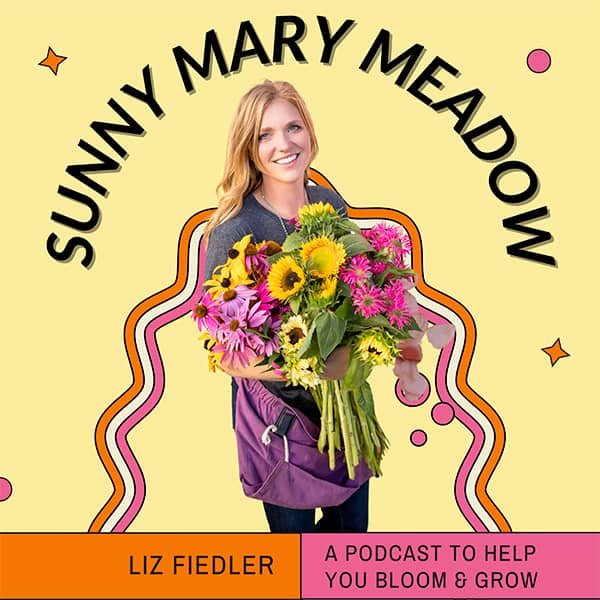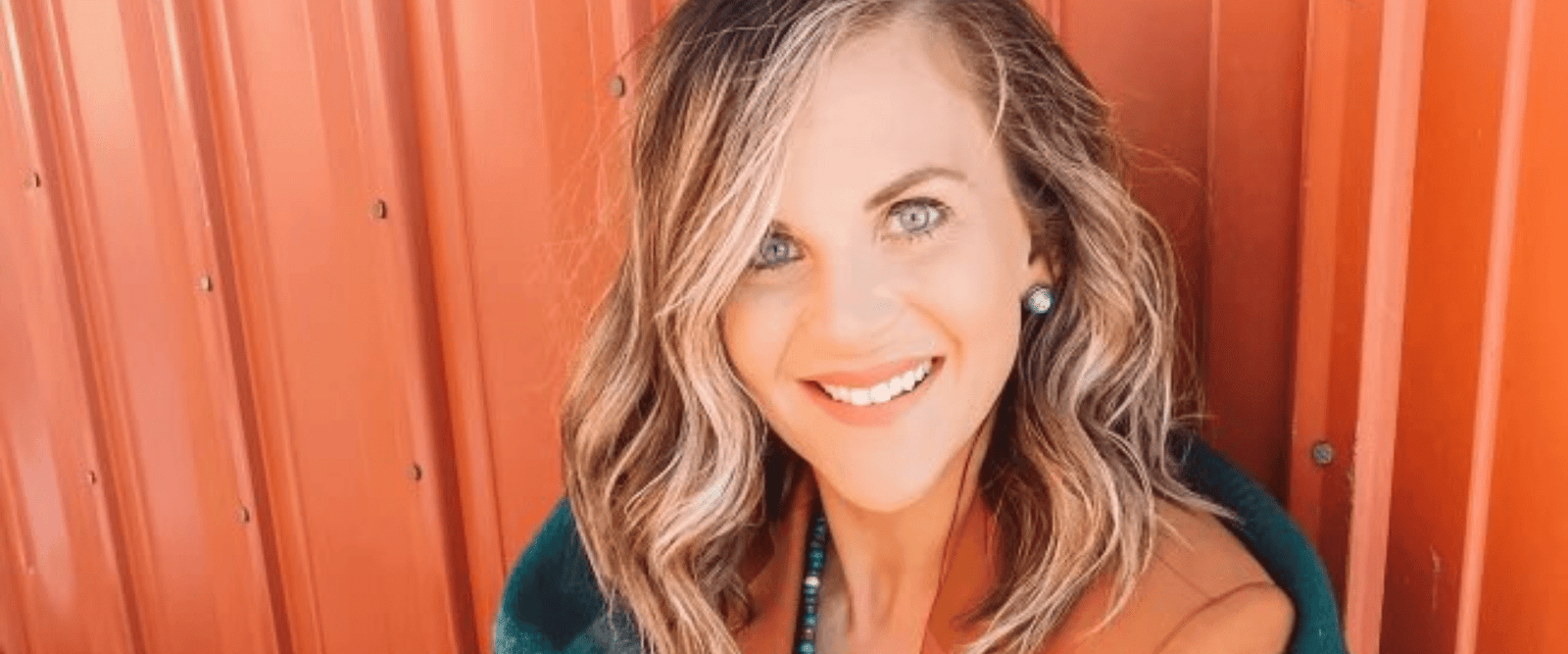
This week, we are doing something a little different. I wanted to record this episode as a way to get conversations started and provoke thought on the word “sustainable.” Everywhere I look, farms are calling themselves “sustainable,” as if it’s a new idea or way of growing. The truth is that farmers have had to figure out how to be sustainable for decades to come, and this isn’t new. It seems to imply that those that aren’t marketing “sustainably grown” are not taking good care of their land and animals. We hope you enjoy this conversation and can maybe learn a different perspective – Bloom & Grow.
Liz: Hello, everyone, and welcome to another episode of the Sunny Mary Meadow Podcast. Today, I have a very fun friend from back in the days of college joining me on the podcast – her name is Amanda Radke. When I was brainstorming topics to talk about for this podcast or what I felt would be beneficial to my listeners, I really started thinking about the word “sustainable.” When I look at other flower farmers, it seems like every single one of them on their Instagram bio says “sustainable” or “sustainably grown,” and I just want to dig a little bit deeper into what that actually means. I called in one of my friends, who happens to be a very informative and motivational professional speaker. I’ll let her give her whole bio with her credentials and everything, but this is really in her wheelhouse, so I wanted to call in an expert!
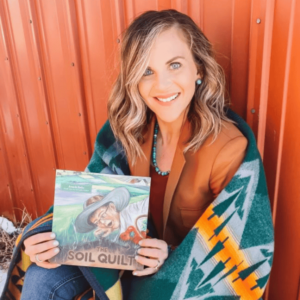
Amanda: Thanks for having me! This is a topic that definitely gets me fired up, so I’m excited to dispel some myths and misconceptions and really shed some light on what real production practices are that people have been doing for generations. It’s not a trending new thing because it’s been something we’ve done forever.
Liz: When I think of the word sustainable, I think, well, of course, I’m trying to be sustainable. I want to have a business in one year, five years, twenty years! Therefore, in every single decision I make, I ask, “Is this sustainable?” Can I keep this up? Can my ground continue to kick out this number of flowers? Do I need to feed it with compost? What nutrients do I need? I’m a little bit confused by people acting like growing sustainably and caring for the land is like this new thing. If anyone’s listening to this and is offended, I promise I’m not trying to attack anyone personally. We’re literally just trying to dispel the myths because I think it really confuses the customers. I think it confuses everyone. I know I’m wondering if I should put sustainable in my bio so that people want to buy from me. No! I mean, I guess if I’m not around in five years, clearly, I wasn’t growing sustainably!
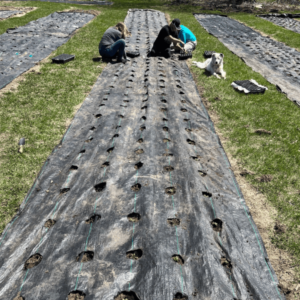
Amanda: Well, it’s funny you say that if you’re around in five years, you were sustainably running your business. That is really what it should mean. If a farmer, rancher, or someone like you grows flowers to sell them if they have a business – are they profitable? If they aren’t sustainable, they’re not going to exist much longer. Land stewardship and environmental stewardship, and profitability go hand-in-hand. It doesn’t make sense to shortcut and deplete your soil health in order to grow more flowers this year because you’re going to have the worst time in the subsequent years. I think it’s really important for people to understand where this all starts from. This isn’t just some buzzword that came out of nowhere that feels good and sounds good. This starts from top corporations, big corporations, who are greenwashing the general public. They’re trying to offset their own emissions on the backs of farmers and ranchers. What they’re doing is trying to sell carbon credits to the farmers. The farmers will get paid for what they’re already doing, which is sequestering the soil and taking care of the soil health, and managing the water and the natural resources, but it doesn’t actually make these corporations greener. They’re still going to do what they’re going to do. I get really fired up because, to me, it really is a manipulation of human emotions and trying to make us feel good when actually it’s not really doing anything. I’m not saying that farmers that are saying there are stainable aren’t. I’m just saying that from the top and down, it has a bigger meaning than what we’re seeing as a trending buzzword on Instagram.
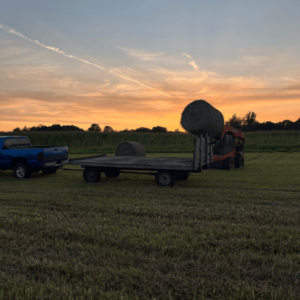
Liz: Liz, you said I don’t do this, but if every year I just sprayed off with Round-up at the end of the year in my garden and never put new nutrients back in, in five years, I wouldn’t have any flowers! So no, of course, I’m not gonna grow that way. Nobody does. I rarely use chemicals or pesticides unless there is a major pest problem, and then we weigh the benefits vs. risks of everything and try to find natural ways to care for the flowers. Anybody can say “organic practices” but not necessarily be certified organic. It’s all just very confusing what that actually can mean. Amanda lives in the middle of South Dakota. I’m not gonna say the middle of nowhere because I have so many friends and family there, and it is a little slice of heaven. But… it is a very different location than where I live. I am on a farm in Central Minnesota, and ultimately in any 10-mile direction, I have a Sam’s Club and a Costco and Walmart. I grow for a very suburban population, and the majority of my listeners are not rural. Amanda, can you tell us a bit more about the word “greenwashing” that you used?”
Amanda: Well, if someone goes to the grocery store and they want beef, you can go down the meat case, and there are so many claims and so many labels from organic to natural to grass-fed to sustainable and carbon neutral. All of these buzzwords. Yes, you need to go through certifications, or might be some steps that that person had to take to put that stamp on that label. However, at the end of the day, what I think it causes it’s just massive confusion. I also will go so far as to say that I think it causes a lot of guilt. People think that if buying food with those labels is the only safe and healthy way to go, and if they can’t afford it, it’s like they are letting down their kids or feel disappointed in themselves for not providing. At the end of the day, find a farmer and get to know now the family, and ask questions. Don’t get caught up in the jargon because a lot of it really is marketing.
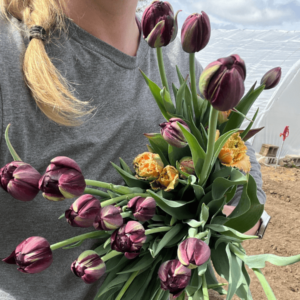
Liz: I could say “locally grown,” but do you guys know it’s locally grown? You guys see me adding the compost from my chicken poop to my garden. My next episode is on soil health and testing. But for right now, I feel like since I’m not constantly marketing my soil practices, people will think I’m simply skipping those things, and it’s just not true. I also wonder if someone who is supposed to be “super green” and bring in semi-loads of compost nobody considers the carbon footprint on that? I’m not getting into a debate on the importance of soil health – it absolutely is important – but it’s so confusing for the end consumer, I think. I’m going to use the example of antibiotic-free milk. I try to explain the withdrawal period and how it’s tested, and that there aren’t antibiotics in any milk. I ask people if they want the cows just to suffer or die when they get mastitis.
Amanda: I think your practicality on the subject comes from your beef cattle background. The beef industry is beaten up a lot for a lot of different things. It’s an easy target and easy punching bag, especially amongst the media and politicians. Whether it’s the whole cow fart thing or the antibiotics, it seems like beef, it’s just number one getting hit on. You have raised cattle, you’ve seen them calve out cows, you’ve bottle-fed baby calves. You know what it takes to get them in the freezer and understand that circle of life. You know what it takes to produce something, so it’s very hard to fall into the emotional marketing schemes that are out there.
I was at the Iowa Cattlemen‘s Association meeting speaking – it was a few years ago – and they were very edgy, and they invited a fake meat company investor. A guy from Silicon Valley would purchase all these different plant-based and even some petri dish lab-based companies as he invested in them. They had him come to speak to share his insight on where he thought the meat industry was going. I challenge your listeners to go to “impossible foods” or “beyond meat” and check out their website and see what these people say. They say we don’t want just to compete, we want to eliminate the meat industry and replace it with our products. Now that is just fine if you want to eat them, but to me, they are declaring war. These grand marketing claims are made that they are more sustainable or more environmentally friendly, or superior to beef. I got backstage and asked him where did these numbers come from? How can you make these claims when it’s comparing apples to oranges? He looked at me point blank and said, “Amanda, I have to get a return on my investment, and we’re gonna tell the consumers what they want to hear, whether we can justify it.” That was so eye-opening to me because I’m not going to tell a lie to sell a product. I have integrity. I’m not going to bash somebody else to sell what I raise. I think my product stands on its own merits, and it will taste great, and I’m proud of it.
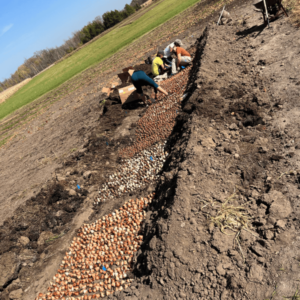
So, this is in every industry. If you are talking about buying a cleaner laundry detergent or soaps for your kids or whatever it might be, there are people that are going to “greenwash” you. They are going to slap a label on it to get a return on their investment. I’m not saying that it’s a blanket “they’re lying,” but it’s important to do your research. And so, it’s really important you do your homework, and you think critically about some of these things, and before you pay an extra dollar for a product just because it makes you feel good, ask if it’s really delivering what they are promising.
Liz: I think another big part of my experience is having grown up in a very rural area where everyone else is rural too. They aren’t disconnected or removed from the farms. Whereas, my audience and customers here don’t have that baseline. They’re asking me about grass-fed beef or whatever, and I will tell you it’s a LOT easier to have a conversation with people that already agree with you! But that’s not where learning comes from. I’m not saying I fully agree with everything Amanda says or my doctor says or whatever, but it’s important to have conversations with people who don’t agree with everything politically or socially or what have you. If you only have a circle of friends that agrees with you or has the same experiences as you, there isn’t learning. These conversations can be tough but are so important.
Another big reason I feel the need for transparency with information is being a family practice nurse practitioner. I see patients get taken advantage of all of the time, and it is so frustrating to me. It seems like there is a big “line” between chiropractors and NPs/PAs/DOs/MDs, and I want first to say I have some chiropractor friends that are fantastic. To me, what I tell my patient is that anytime someone gets a commission off of something that they recommend, ask yourself why. A lot of private practice places are popping up everywhere. If that’s how they make their money, and they’re the only ones telling you that you need something, maybe that’s a red flag to ask more questions. There are no such things a fat-burning IV hydration for $200/week. They are preying on desperate women trying to get back to their pre-pregnancy weight. That’s what’s happening. They know you are vulnerable. Or else they tell you that you need 8000% of vitamin C. Well, we know what 100% is. We know what happens when you don’t get enough Vitamin C or Vitamin D. You get scurvy or you get rickets. But I really think that 20, 30 years from now, we are going to find out what happens when you get too many of these vitamins. Never before have we consumed 1000% daily value or something. Our body is meant to absorb what it needs and excrete the rest. So maybe you’re just peeing it out or having really expensive urine.
Amanda: Yes, marketing in every industry has gone over the top in making grand claims that make it seem like their competition is inferior or unsafe. I don’t want people to think I have an inferior product because I’m not greenwashing and throwing these labels out there. I know I could do that too, but that’s not just who I am. My product is what it is. We sell beef locally, and then we get all kinds of questions. I’ve had people not buy for that reason because, yes, we do antibiotics when our cattle are sick. We’re not going to let them suffer. Yes, we do feed them grain, and honestly, I think the flavor is better with the grain fat at the end. It adds to that marbling profile. It’s just a different flavor than grass-fed beef and things that maybe don’t match up with someone’s values or whatever they are shopping for. I can walk a delicate balance of not bashing the grass that is fed farmer or the person that’s all-natural. If they have a niche and they have a customer base that wants to pay for that, more power to you. I believe in capitalism, and I believe that no two farms are going to look alike.
My sister grows flowers over here in a Mitchell way different than you do. The setup she has and the land she’s working with, and the weather and whatever. There really are no two farms perfectly alike unless you’re talking about the mega-farms. They can all do it the same because they can control all the variables. So, I guess it’s really a balance between shopping your values, but as you said, not falling prey to marketing schemes that take advantage of you and make you pay more for something that you’re really not getting.
Liz: I think that the biggest thing – the advantage. For example: grass-fed. If you see a label of grass-fed beef and then the general person sees another steak that is not labeled that way, the consumer thinks that the poor animal never got a bite of grass in its entire life. It doesn’t mean that we have never fed that one grass. A ton of their diet is so sad. But that doesn’t mean I’m gonna let you talk on that, but what I’m trying to say here is that it doesn’t mean that we’ve never fed that one a diet of grass. A ton of their diet is grass, it’s just not exclusively grass-fed. You want a well-rounded, tasty product at the end of the day with the animal getting proper nutrients. Or when people say they want no antibiotics in their meat. I promise there aren’t antibiotics in your meat! There are testing and standards at every single sale barn in the country. They take the animal’s temperature and are evaluated for safety. No sick animals are going to the butcher.
Amanda: I think that grass-fed misconception is so true. People think that the cows were on pasture their whole life. They think the grass-fed ones get to roam free, and the grain-fed ones don’t, and they are confined. It’s really funny because, well, it’s winter. Do you see much grass growing in South Dakota or Minnesota right now? No, you do not. Those grass-fed cattle are in pens right now, eating a hay bale that was cut in the summertime. They are not grazing on this peaceful pasture that makes a picturesque marketing picture. My cows are doing the same thing; they are eating the same thing. If our cows were out in a pasture right now, they would die. I do explain at times that our beef is grass-fed and grain-finished because that really does clarify better what their diet really is, but even that feels like I’m falling into the marketing thing. It would take a lot of money to feed all corn all of the time. As we said, we need to be sustainable. It goes along the way of completely trashing your soil to get good flowers this year. It’s going to hurt your next year. Just not feeding your cows corn constantly and getting them overweight and unhealthy. There are standards, and ultimately when you grow better products, you do get paid more. If you don’t get paid, you can’t stay in business. It all coordinates together.
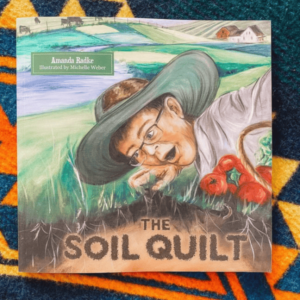
I do want to talk for a minute about if it is of interest to you to learn more about soil health and regenerative ag and sustainability. We care about our natural resources and our environment. Again, it all goes hand in hand. We want to leave behind something for our kids and grandkids to enjoy. I wrote a children’s book titled “The Soil Quilt,” and it’s with Minnesota illustrator Michelle Weber. The book talks about the five principles of soil health and ways that we can take care of our dirt or soil, whether you have a backyard garden with flowers and tomatoes or a huge field of corn. Those five principles: Number one is soil cover. So, I imagine you do this, but if you don’t keep plant residues on the soil to prevent erosion, start building that soil health. Next is having that limited disturbance, so minimizing how much you’re tilling just to build up your soil aggregate and your organic matter. Next is diversity – you have this in your garden with all your different varieties of flowers by trying to mimic nature with cool season grasses, etc. You add three or more crops or cover crops in a rotation. In the cattle industry, we will plant cover crops, which are like turnips and radishes, and alfalfa seeds in between corn rows. After we harvest the corn, those cattle then go out onto the field and graze. They eat big old turnips and pick them up out of the dirt and eat them. What they’re doing is adding nutrients to the soil as they’re grazing. It is really a win-win. Next is living roots, so keeping plants growing throughout the year to feed the soil. That’s kind of tricky in the middle of the winter, but it’s a good way to add to that. And finally, the big piece for me is integrating livestock.
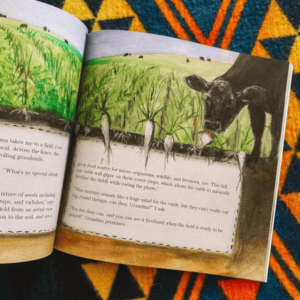
When we hear that animals don’t belong on the landscape and that we would have a healthier planet without livestock, that gets me fired up. They provide fertilizer, and they improve nutrient cycling on the land. They also protect wildlife habitat. In the summer months, I can see my cows grazing, but there are also going to be butterflies and foxes, deer, and all these other animals that are living and coexisting in that ecosystem.
Farmers had to learn the hard way in the dirty 30s. We had major droughts and food shortages, and things have shifted over time. I think that is why farmers are so hesitant to use these buzzwords because this is stuff we have been doing since Grandpa and Great Grandpa’s time. It’s not new to us, even though it feels new because it’s trending on social media.
Liz: I think there is a difference between tilling and working on new soil in an existing bed than trying to stir in the compost or just constantly leaving bare earth. I feel like I get hate for being “not no-till,” and I promise I’m trying really hard just to take care of my soil and make sure it’s going to produce for generations to come. I did a whole episode on growing in small spaces, and one of the things I talked about was my tulips. I pull them up in the spring, and something else goes there, and it’s a constant rotation of crops. The thing is, we are taking care of our land. Just because we aren’t constantly talking about it doesn’t mean I’m not doing it. But I want to build a brand and a business around something else. Of course, I want to be sustainable. I want a business that can sustain for my children to have in 30 years if that’s what they want, and sustainable growing practices go hand in hand with it. But I think it’s confusing to customers if one says they are sustainable and the other says they aren’t. It implies that the other is doing things “wrong” or “doesn’t care about the environment.”
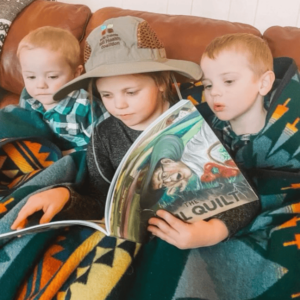
Amanda: We all want to be able to go to the grocery store or a local farmers’ stand or whatever to feed our families. We want to stick to a budget and not use all of our disposable income on our food so that we can do other things like go to the park or pool or whatever. Food is more expensive now than ever before, and so people are feeling the pinch. The far extremes, on both sides, politically, write articles, and they get paid for clicks, so they fear monger. I have found in my years of blogging that I would get more clicks on my blog post if I really went all the way in to freak people out. It would work every single time, and yet I can’t do that. I feel a responsibility to alleviate concerns and to get people to feel confident in their food supply and farmers and ranchers, but that’s not gonna go viral on social media; it just isn’t. Even if you agree, and if you’re ultra-conservative and you believe this media pundit and everything they have to say, remind yourself that they do get paid better by advertisers if they really work people up. Take a step back, take a deep breath, use your critical thinking, and just realize it’s another day of outrage culture where we’re supposed to be upset about something new.
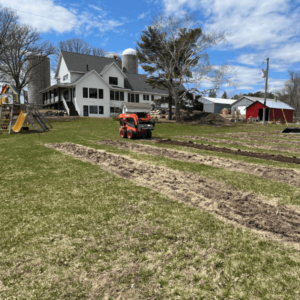
Liz: Just take a step back and go buy some flowers for your dining room table, and you’ll feel better!
Amanda: I do want to challenge anyone that’s listening and ask you to try to grow some of your own food. If it’s just one tomato in a pot on your patio. Because I have to tell you, I decided I was going to start food prepping and canning and gardening, and let me tell you, it is hard to grow your own food! I have already given up. I got like two carrots after an entire summer. When you do that, you grow an appreciation of your food supply. You feel that appreciation for the farmers and ranchers that are doing the work and doing it well and with excellence. Also, it’s just really therapeutic to get your hands on the soil and try something. Even if you fail, just try to plant something. Whether it’s a flower or a fruit or vegetable, grow it this summer and see what your family learns.
Amanda’s contact information:
Thanks for listening to/reading the Sunny Mary Meadow podcast/blog. I’m your host, Liz. If you like what you’re hearing/reading, please subscribe and rate us. You can also find us on Instagram, Pinterest, and Facebook.
You can subscribe to our email newsletter below. We love to hear any podcast-related feedback at our email podcast@sunnymarymeadow.com, and all other inquiries can be sent to liz@sunnymarymeadow.com.
